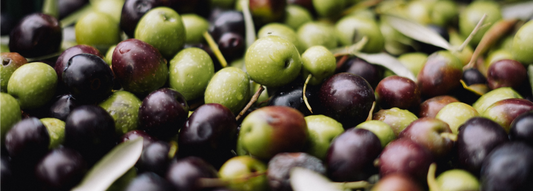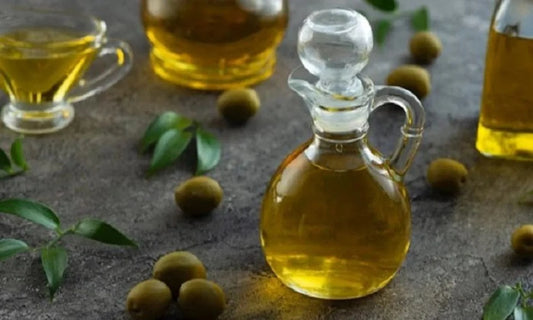As a health-conscious person, you may have noticed a trend in recent years among influential people in the wellness industry advising you to steer clear of seed oils in your diet, with the recommendation to use extra-virgin olive oil instead.
You won't get an argument out of me, as a licensed dietitian-nutritionist, regarding the health benefits of olive oil, but as for whether seed oil should be avoided, that's a tougher call. It certainly doesn't surprise me that yet another food has been scapegoated as the "bad guy." We've been there before: Let's blame America's health problems on fat and eat low-fat foods instead! No, let's blame sugar! Ok, time to blame fat again (seed oils)!
The reality is, there isn't any one food or macronutrient to blame for modern day health problems. A variety of factors influence health, including food, genetics, lifestyle, and environmental factors. To find out if concerns about the healthfulness of seed oils are based in science, let's first take a moment to understand the different sources of oils, how they are manufactured, and how their chemical composition interacts with the environment and our own biology.
What are seed oils?
Seed oils are a type of vegetable oil, which is a general term that refers to edible oils from plants. Some of the most common vegetable and seed oils used in the United States are soybean, canola, palm, peanut, safflower, sunflower and corn oil.
These oils may be refined, bleached, and deodorized during manufacturing. Oils can also be extracted from the seed with chemicals like hexane. Some of these processes may make seed oils less healthful; cold-pressed or expeller pressed oils generally will be healthier options when it comes to seed oils.
Is olive oil a seed oil?
Olive oil (often sold as extra-virgin olive oil) is considered a vegetable oil, but not a seed oil, because it's not derived from the seed of the olive. While all seed oils are considered vegetable oils, all vegetable oils are not necessarily seed oils. Additionally, some of the oils we consider vegetable oils don't always come from vegetables; olives, avocados and coconuts are botanically classified as fruits, yet they are often referred to as vegetable oils.
Are seed oils bad for our health?
Are seed oils inherently bad? No, and may even confer some benefits.
Is what happens to seed oils during processing, storage, and cooking the problem? Yes.
Is overconsumption of seed oils (and other fats) coupled with underconsumption of fatty fish and other sources of omega-3's the problem? Yes!
Here's what makes it complicated. Omega-6 fatty acids, such as linoleic acid, which can be found in seed oils, may contribute to inflammation if they are not balanced out with enough omega-3s. In contrast, omega-3s may exert anti-inflammatory effects which can benefit you head to toe, from your blood pressure to your immune system to your brain health. The importance of the omega-6-to-omega-3 ratio can't be overstated!
When we consume oxidized oils or too much polyunsaturated omega-6 (abundant in vegetable oils) without enough omega-3 to balance it out, it can potentially lead to inflammation. Inflammation is the common denominator among many common health problems.
Which seed oils should you avoid?
Hydrogenated and partially hydrogenated vegetable oils should be avoided as they can contain trans fats due to the hydrogenation process. Cottonseed oil, palm oil and soybean oil are examples. You'll also want to avoid any highly processed oils.
On the other hand, safflower and canola are available cold-pressed, which is a better way to consume these oils.
What makes an oil unhealthy?
We all have our favorite oils to cook with, whether it be their taste, health benefits, price points or their cooking properties. Some oils are more neutral, while others have a distinct flavor and some recipes call for a particular oil. Any oil can be enjoyed on occasion—whether it's because it bakes well or you simply have a personal preference.
That being said, the following "oil red flags" should be taken into account when you're deciding whether to use a particular oil on an everyday basis.
1. Oxidation of oils and rancidity during processing, storage, and cooking
All fats can become spoiled when exposed to oxygen (even extra virgin olive oil and unrefined coconut oil). However, polyunsaturated fats do spoil most readily. This is why it's important to store your oils properly. Manufacturers may alter the chemical structure of vegetable oils to make them more stable (hydrogenation) or add preservatives like TBHQ.
A 2022 study measured changes in fatty acid composition in edible oils after repetitive short-time heating that resembled conventional household use. They found that "repeated heating of vegetable oils resulted in a significant decrease in the nutritionally mostly beneficial polyunsaturated fatty acid values, while values of trans and saturated fatty acids with mostly unfavorable nutritional effects significantly increased."
2. Hydrogenation and trans fat
Margarine and shortenings (which can be made from palm oil, cottonseed or soybean oil) have historically been the source of trans fat due to a process called hydrogenation. Products don't differentiate if the trans fats are natural or artificial, so it's a good idea to avoid trans-fat intake in general. However, the FDA has taken steps to remove artificial trans fats from processed foods (finally, after 50 years). Further, recycling oils when cooking (like using the same oil for multiple batches of fries) can lead to generation of polycyclic aromatic hydrocarbons (PAHs) and trans-fats.
3. Chemicals used during processing
It's sound advice to avoid anything that is ultra-processed; this includes oils. One of the chemicals used during processing that people are concerned about is hexane. However, according to Harvard, residual hexane is small and does not represent a concern. Still, you can avoid hexane and other chemicals introduced during manufacturing by choosing cold-pressed or expeller pressed oils.
4. Smoke point
Just like the high heats that can occur during processing of oils, cooking them at too high of a heat can lead to unwanted changes in their chemical structure. High heat exposure during manufacturing and cooking of oils can lead to oxidation of oils, production of trans-fats, polycyclic aromatic hydrocarbons (PAHs), and free radicals.
One study found that heat treatment of canola oil (15 min at 356º F) increased the number of polycyclic aromatic hydrocarbons. High heat cooking of vegetable oils, such as corn oil, can cause lipid oxidation that forms trans fat. (Side note: There's a general misconception that olive oil isn't an optimal oil for sautéing due to having a low smoke point. But high-quality extra virgin olive oil has a relatively high smoke point of approximately 375-400º F!)
How to eliminate seed oils from diet? Healthy swaps
Aside from using alternative oils and other fats when cooking, the other way to eliminate seed oils form your diet is to limit processed foods and be more selective about the packaged foods that you do buy. Processed oils, including seed oils, can be found in a variety of packaged foods including some of the more obvious things like salad dressings to some of the not-so-apparent things like crackers.
When it comes to salad dressings, consider making your own so that you can choose the oil. Plus, you'll find it to be very flavorful since many dressing recipes call for spice, fresh herbs and garlic or shallots, or a squeeze of lemon. If you are in a pinch and need some store-bought oil, look at what oil it contains: it's usually the first or second ingredient in the list so it's not that hard to spot. I've found that soybean oil or canola oil is most commonly used in premade dressings, but anything that has extra-virgin olive oil in the ingredients list likely is a superior choice. Or just keep it simple with staples that you may already have on hand like an olive oil and balsamic vinegar combo.
Deep fried foods are not only calorie dense, but are also sources of trans-fat. Try baked fries drizzled with just a touch of extra-virgin olive oil. That way, you end up using less fat and can control the temperature easily and type of fat used to coat the sheet pan.
Health benefits of olive oil
It's not just about fats and their chemical structure that dictate their beneficial or negative impact on health. Since the fats we are discussing come from plants, you'll also receive some of the other compounds found in these plants – like polyphenols such as oleuropein and hydroxytyrosol. In fact, many of the health benefits of olive oil are thought to be a result of its polyphenol content, and the antioxidant activity from it.
Is extra virgin olive oil good for you? This staple of the Mediterranean diet has been shown to support:
- Healthy blood sugar
- Heart and vascular health
- Anti-inflammatory response
- Brain health
- Bone health
- …and more!
Health benefits of avocado oil
When it comes to avocado oil vs olive oil, both olive and avocado oil are rich in monounsaturated fat (MUFA), both of which can support a healthy cholesterol level but avocado oil has a higher smoke point. A higher smoke point can help minimize the amount of oxidation that occurs during cooking and avocado oil can be heated up to 520º F.
Research suggests that avocado oil has benefits of its own, as it is a heart-healthy oil high in unsaturated fat as well as vitamin E. It also has a high amount of oleic acid (MUFA), which has been shown to help support healthy blood pressure. Avocado oil also contains lutein and vitamin E, which help support eye and skin health.
Is grapeseed oil healthy?
Black seed oil is indeed a seed oil. The black cumin seeds are derived from the Nigella sativa plant. While you can use black seed oil for cooking, its more commonly consumed in dietary extract form. It also can be used topically in hair and skincare products.
| Saturated Fats vs. Unsaturated Fats
Two fatty acids with very similar names (both unsaturated) are considered essential. Meaning, we need them from our diet because our bodies cannot make them. These are linoleic acid (omega-6) and alpha linolenic acid (omega-3). |
Which is the best oil for you?
Olive oil, which is produced from the "vegetable" (but really, the fruit) and not the seed, is arguably one of the healthiest oils. Avocado is a close second, especially when it comes to cooking at higher temperatures. Plus, the monounsaturated fats that olive and avocado oils contain are slightly less susceptible oxidation compared to polyunsaturated fats.
Ultimately, when it comes to fat consumption, some variety is key to ensure our we have a good fatty acid profile for optimal health. Despite conflicting advice from health experts and researchers, the good news is that there are some practical tips that can be helpful:
- Be selective about vegetable/seed oils and choose cold-pressed or expeller pressed oils
- Store your oils in a dark bottle, away from heat, and possibly in the fridge (depending on the oil)
- Don't reuse cooking oils at home and avoid fried foods – especially from restaurants because you don't know how often they change their oil.
- Take an Omega Index Blood Test to check on your own fatty acid profile
- Take a fish oil or algae extract to ensure you are getting enough EPA, DHA, and other important omega-3's
- You don't need to avoid saturated fats entirely, but you should consume them in moderation
- Limit packaged/processed foods
- Avoid margarines and hydrogenated oils/fats




